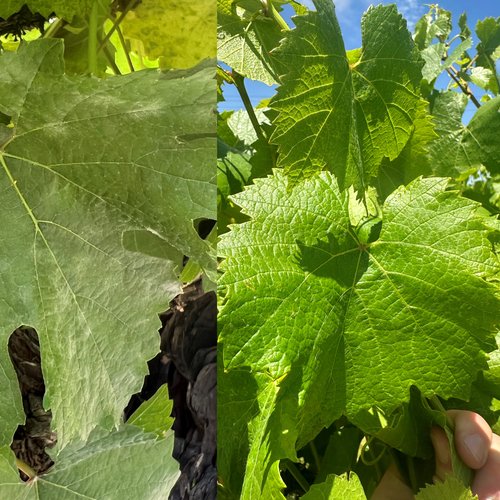Australian food producers on a quest to boost their sustainability credentials are finding a beacon in a new-generation fertiliser that is redefining the agricultural industry’s understanding of nitrogen.
Lono, a smart fertiliser developed by UK-based Levity Crop Science, has been trialled extensively around Australia for the past two years where farmers and agronomists claim it is shaping up as an affordable and sustainable solution.
ProdOz crop science technologist Zenon Kynigos says ProdOz has collaborated with producers and industry agencies to conduct the trials.
He said farmers, agricultural consultants and agronomists had reported promising on-farm results including improved yield and soil quality and a reduction in pollution, while agricultural suppliers reported high demand.
“Farmers adopting Lono in Australia are witnessing the benefits for themselves. Enhanced nitrogen stability and availability translates to improvements in crop health, vigour, and yield, offering tangible economic benefits and reducing the environmental footprint of farming operations,” Mr Kynigos said.
“Lono has a strategic focus on reproductive growth, directing plant development towards flowers, fruits, and roots.
“Leveraging Levity's LimiN chemistry (published in nine research papers), Lono holds nitrogen in the amine form, offering benefits beyond conventional nitrogen fertilisers,” he says.
Gaining ground in horticulture, Lono can also be used in broadacre crops such as wheat and cotton.
In Western Australia, the Galati Group has been trialling Lono across six vegetable sites for two years, where it has delivered impressive results in potato, onion, carrot, broccoli, cauliflower, cabbage, cucumber, eggplant and capsicum crops.
Co-principal Vince Galati said we are always on the search to minimise nitrogen inputs and enhance the health of our crops and were intrigued when we read about Levity Crop Science and Dr David Marks (who invented Lono).

“Our results have been very encouraging. We’ve minimised our nitrogen inputs, the crop health has been enhanced and we’ve had better quality and yield and good healthy plant growth that is manageable,” he says.
“The trials have been extended to all vegetable sites and Lono is part of our R&D strategy to use less fertiliser.”
He says a visit by Dr Marks and the ProdOz team last winter reinforced the relationship which was solid from the start.
“We trust the team and the science and have faith in the product,” Mr Galati says.
Costa Avocados national agronomist Craig Boyce says Lono has the potential to account for 15-20 per cent of its nitrogen program following trials conducted during the past 12 months at multiple sites on the eastern seaboard.
“There’s very good science behind it and it caters for a need other people haven’t thought about,” he says.
“It’s a specialist tool with very specific timing and for a very specific reason which, for us, is when we have a nitrogen v yield conflict in our crop. We’ve seen improved yield and nitrate levels, and it will, no doubt, remain part of our nitrogen program.”
“We grow a range of crops with a range of agronomists and we’re all sharing learnings and opportunities in what is a price-conscious market,” he says.
Ongoing trials of Lono are being conducted in south-east Queensland as part of water quality improvement programs delivered across a number of commodities with horticultural growers. These programs aim to improve on-farm practices to minimise environmental impacts and get the most out of every crop.
Industry agronomists say early results from vegetable trials show Lono ticks all boxes as an economical, agronomical and environmental solution.
Agronomist Tim Walker of Walker Ag Consultancy, Tasmania learnt of Lono when he met the ProdOz team at Hort Connections.
For the past year he has facilitated trials in various commodities, but predominantly potatoes in Tasmania and Victoria.
He has recently begun a brassica program, due to wrap up this winter, as well as hosting a grower forum attended by Dr Marks, who discussed nitrogen use and the benefits of Lono, sparking demand for the product.
“Where Lono is used on potato crops, we’re confident it can replace 20 per cent of nitrogen used on the crop – a significant saving for the grower,” Mr Walker says.
“The potential is there for Lono to become part of the regular nutritional program in potato production. It mixes well with fungicides and seems to work best in soils where nutrition is lacking,” he says.
Agricultural supplier Yolla Co-Op at Latrobe, Tasmania, has stocked Lono since it was showcased to an eager farming community at a vegetable conference two years ago.
“Ever since then, farmers have wanted to try it. Demand has been so high that as fast as we got it in, it sold out. Local vegetable growers, mostly those growing potatoes are happy it has increased their yield,” sales manager Kellie Wright says.
Mr Kynigos says traditional fertilisers predominantly delivered nitrogen in the nitrate form, leading to excess vegetative growth at the expense of fruit development – a phenomenon known as the ‘nitrate effect.’
“Lono addresses this by providing stabilised amine nitrogen, promoting bushier growth, enhanced root branching, and increased flower and fruit production through naturally elevated cytokinin hormone levels. Lono changes where a plant allocates growth – known as ‘growth partitioning.’
Developed through extensive research and technological innovation, Lono’s advanced formulation ensured maximum retention and use by crops, he says.
“Australian farmers want to be more sustainable, but they can only use what they have access to. Lono’s an option that is delivering some great outcomes and works in all crops.”





